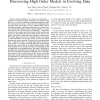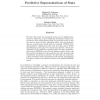120 search results - page 14 / 24 » Predictive Learning Models for Concept Drift |
JMLR
2010
13 years 2 months ago
2010
We present a general method for explaining individual predictions of classification models. The method is based on fundamental concepts from coalitional game theory and prediction...
ICDE
2008
IEEE
14 years 9 months ago
2008
IEEE
Abstract-- Many applications are driven by evolving data -patterns in web traffic, program execution traces, network event logs, etc., are often non-stationary. Building prediction...
NIPS
2001
13 years 9 months ago
2001
We show that states of a dynamical system can be usefully represented by multi-step, action-conditional predictions of future observations. State representations that are grounded...
TFS
2008
13 years 7 months ago
2008
Abstract--In this paper, we introduce a novel approach to timeseries prediction realized both at the linguistic and numerical level. It exploits fuzzy cognitive maps (FCMs) along w...
ECTEL
2006
Springer
13 years 11 months ago
2006
Springer
Bayesian networks are commonly used in cognitive student modeling and assessment. They typically represent the item-concepts relationships, where items are observable responses to ...


